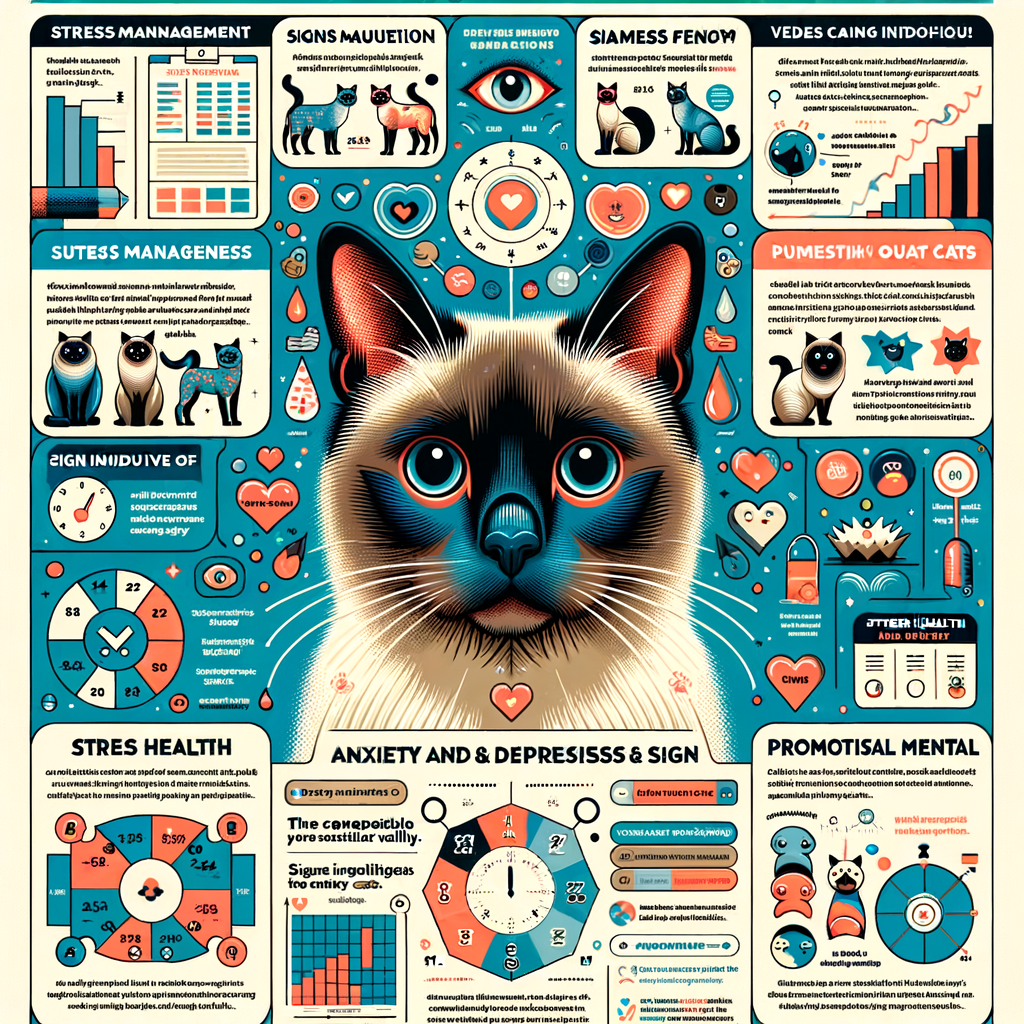
Introduction to Siamese Cat Behavior
Siamese cats are a unique breed, known for their striking appearance and distinctive behavior. They are often described as social, intelligent, and vocal. However, understanding their behavior requires more than just these general descriptions. In this section, we will delve into the unique traits of Siamese cats and debunk some common misconceptions about their behavior.
- Unique Traits of Siamese Cats
- Common Misconceptions About Siamese Cat Behavior
Siamese cats are known for their high energy levels and playful nature. They are often seen running around the house, climbing on furniture, and playing with toys. Their intelligence is also a standout trait, as they are quick to learn new tricks and commands. Siamese cats are also known for their strong bonding with their human companions. They are often seen following their owners around the house and seeking their attention. Their vocal nature is another distinctive trait. Siamese cats are known to “talk” to their owners with a range of sounds and tones.
There are several misconceptions about Siamese cats that can lead to misunderstandings about their behavior. One common misconception is that Siamese cats are aloof and independent. In reality, they are very social and crave companionship. They may become depressed or anxious if left alone for long periods. Another misconception is that they are aggressive. While Siamese cats can be assertive and territorial, they are not inherently aggressive. They are often misunderstood due to their vocal nature and high energy levels. Understanding these misconceptions can help owners better understand and care for their Siamese cats.
Understanding Siamese Cat Psychology
Siamese cats are known for their distinctive personalities and emotional complexity. Understanding their psychology can help you provide a nurturing environment for your feline friend.
Siamese Cat Emotional Health
Emotional health is just as important for cats as it is for humans. A Siamese cat’s emotional health can greatly influence its behavior and overall well-being. Let’s delve into the signs of a happy and unhappy Siamese cat.
- Signs of a Happy Siamese Cat
- Signs of an Unhappy Siamese Cat
A happy Siamese cat is active and playful. They will often purr and rub against you, showing their affection. Their eyes will be bright and alert, and their body language relaxed. They will also have a healthy appetite and show interest in their surroundings. Remember, a happy cat is a healthy cat.
On the other hand, an unhappy Siamese cat may display signs of stress or anxiety. This could include hiding, loss of appetite, excessive grooming, and changes in behavior. They may also become less active and show less interest in play or interaction. If you notice these signs, it’s important to consult with a vet or a pet behaviorist.
Understanding your Siamese cat’s emotional health is crucial in maintaining their happiness and well-being. By observing their behavior and responding to their needs, you can ensure a fulfilling and enriching life for your Siamese cat.
Mental Health in Siamese Cats
Just like humans, Siamese cats can also experience mental health issues. It’s crucial to understand and recognize these conditions to ensure your feline friend’s overall well-being. Let’s delve into some common mental health issues in Siamese cats.
- Understanding Siamese Cat Stress
- Recognizing Siamese Cat Anxiety
- Identifying Siamese Cat Depression
Stress in Siamese cats can be triggered by various factors such as changes in their environment, lack of stimulation, or even a new family member. Signs of stress include excessive grooming, changes in eating habits, and unusual aggression. It’s important to identify these signs early to help your cat cope with stress effectively.
Anxiety in Siamese cats can manifest in several ways, including excessive meowing, hiding, and even inappropriate elimination. These cats are known for their strong bonds with their owners, and separation can often lead to anxiety. Providing a safe, comfortable space and plenty of interaction can help alleviate anxiety symptoms.
Depression in Siamese cats can be harder to recognize. However, signs may include loss of appetite, lethargy, and disinterest in play. If you notice these signs, it’s important to consult with a vet. They may suggest changes in your cat’s environment, diet, or even prescribe medication to help manage the symptoms.
In conclusion, understanding your Siamese cat’s mental health is crucial for their overall well-being. By recognizing the signs of stress, anxiety, and depression, you can take steps to provide the necessary care and support for your feline friend.
Siamese Cat Mental Wellness
Understanding the mental wellness of your Siamese cat is crucial for their overall health and happiness. This section will focus on how to manage stress in Siamese cats and provide them with a mentally stimulating environment.
Siamese Cat Stress Management
Stress can have a significant impact on your Siamese cat’s mental wellness. It’s important to understand how to create a stress-free environment and provide mental stimulation to keep your cat happy and healthy.
- Creating a Stress-Free Environment
- Providing Mental Stimulation
Creating a stress-free environment for your Siamese cat involves ensuring that they have a safe and comfortable space. This includes providing them with a quiet place to retreat, keeping their litter box clean, and maintaining a consistent routine. It’s also important to avoid sudden changes in their environment, as this can cause stress.
Mental stimulation is essential for Siamese cats, as they are known to be intelligent and curious. This can be achieved by providing them with interactive toys, puzzle feeders, and regular playtime. Engaging your cat in activities that challenge their mind can help reduce stress and improve their mental wellness.
In conclusion, understanding and managing your Siamese cat’s stress is a key aspect of their mental wellness. By creating a stress-free environment and providing mental stimulation, you can ensure that your cat is happy, healthy, and mentally stimulated.
Siamese Cat Anxiety
Siamese cats, like humans, can experience anxiety. It’s important to understand how to recognize the signs of anxiety in your Siamese cat and how to manage it effectively. Let’s explore this topic in more detail.
- Recognizing Signs of Anxiety
Recognizing anxiety in your Siamese cat can be challenging, but there are some common signs to look out for. These include:
- Excessive grooming or scratching
- Changes in eating habits
- Unusual aggression or fearfulness
- Excessive meowing or yowling
- Changes in litter box habits
These signs can indicate that your Siamese cat is feeling anxious. It’s important to remember that every cat is unique, and what may be a sign of anxiety in one cat may not be in another. If you notice any of these signs, it’s important to consult with a veterinarian.
- Effective Anxiety Management Techniques
Managing anxiety in your Siamese cat involves creating a calm and secure environment. Here are some techniques that can help:
- Provide a safe space: Make sure your cat has a quiet, comfortable place where it can retreat when feeling anxious.
- Consistent routine: Cats thrive on routine. Try to feed, play, and interact with your cat at the same times each day.
- Interactive play: Play can help reduce anxiety. Use toys that mimic prey, like feather wands or laser pointers, to engage your cat in play.
- Comforting scents: Certain scents, like catnip or pheromones, can help calm your cat. Consider using a diffuser or spray in your home.
Remember, it’s important to consult with a veterinarian if your Siamese cat is showing signs of anxiety. They can provide further guidance and treatment options.
| Signs of Anxiety | Management Techniques |
|---|---|
| Excessive grooming or scratching | Provide a safe space |
| Changes in eating habits | Consistent routine |
| Unusual aggression or fearfulness | Interactive play |
| Excessive meowing or yowling | Comforting scents |
Understanding and managing your Siamese cat’s anxiety is crucial for their mental wellness. By recognizing the signs and using effective management techniques, you can help your Siamese cat live a happier, healthier life.
Siamese Cat Mental Health Tips
Siamese cats are known for their striking features and affectionate nature. However, like all pets, they require care and attention to maintain their mental health. Here are some tips to help prevent mental health issues in your Siamese cat.
Preventing Mental Health Issues
Prevention is always better than cure, especially when it comes to your pet’s mental health. Here are two key strategies to keep your Siamese cat mentally healthy:
- Regular Vet Check-ups
- Importance of Socialization
Regular vet check-ups are crucial for your Siamese cat’s mental health. These check-ups can help detect any potential health problems early, which can prevent them from escalating into serious issues. Vets can also provide advice on how to manage your cat’s stress levels and improve their overall mental well-being.
Siamese cats are social creatures. They thrive on interaction and companionship, which can significantly impact their mental health. Encourage your cat to socialize with other pets and people. This can help them develop confidence, reduce anxiety, and promote a sense of security and happiness.
Remember, a happy cat is a healthy cat. By following these tips, you can help ensure your Siamese cat’s mental health is in top shape. Stay tuned for more tips on how to treat mental health issues in Siamese cats.
Treating Mental Health Issues
Just like humans, Siamese cats can experience mental health issues. It’s important to know when to consult a vet and what therapies and medications are available to help your feline friend. Let’s take a closer look.
- When to Consult a Vet
If your Siamese cat is showing signs of distress, such as changes in behavior, loss of appetite, or excessive grooming, it might be time to consult a vet. These could be signs of a mental health issue. It’s always better to be safe and get your cat checked out if you notice anything unusual.
Remember, you know your cat better than anyone else. If you feel something is off, don’t hesitate to seek professional help. Early intervention can make a big difference in your cat’s mental health.
- Therapies and Medications
There are various therapies and medications available to treat mental health issues in Siamese cats. The treatment plan will depend on the specific issue your cat is facing.
Therapies can include behavior modification techniques, such as positive reinforcement, to help your cat overcome anxiety or fear. In some cases, your vet may recommend medication to help manage your cat’s symptoms. This could be a short-term solution to help your cat cope with a stressful situation, or a long-term treatment plan for ongoing mental health issues.
It’s important to follow your vet’s advice and give any prescribed medication as directed. Remember, the goal is to help your cat live a happy and healthy life.
Here’s a simple table summarizing when to consult a vet and possible treatments:
| When to Consult a Vet | Possible Treatments |
|---|---|
| Changes in behavior, loss of appetite, excessive grooming | Behavior modification techniques, medication |
Conclusion: Understanding Your Siamese Cat
As we wrap up our discussion on Siamese cats, it’s clear that these unique felines are more than just their striking appearance. They are intelligent, affectionate, and have a complex psychology that requires understanding and care. Let’s summarize the key takeaways and provide some further resources for you to continue your journey in understanding your Siamese cat.
- Key Takeaways
Siamese cats are known for their intelligence and social nature. They thrive on interaction and can become depressed if left alone for long periods. Mental stimulation is crucial for their wellbeing.
Understanding a Siamese cat’s psychology is key to maintaining their mental wellness. They are sensitive creatures that respond to the emotions and behaviors of their human companions. Positive reinforcement and a stable environment are beneficial for their mental health.
Siamese cats are prone to certain mental health issues, such as anxiety and depression. Regular play, interaction, and mental stimulation can help mitigate these issues. If symptoms persist, professional help should be sought.
- Further Resources
For more in-depth information about Siamese cats, consider reading books like “The Complete Guide to Siamese Cats” or “Siamese Cats: Legends and Reality“. These provide comprehensive insights into the breed’s history, behavior, and care needs.
Online forums and communities, such as “Siamese Cat Spot” or “The Siamese Cat Society“, are also excellent resources. They offer a platform to interact with other Siamese cat owners and experts, ask questions, and share experiences.
Remember, understanding your Siamese cat is a journey, not a destination. Every day will bring new learnings and experiences. Embrace them, and you’ll build a deep, rewarding relationship with your feline friend.








